外研版(2019)必修第二册Unit 2 Let's celebrate! Using Language 名师课件(25张ppt)
文档属性
| 名称 | 外研版(2019)必修第二册Unit 2 Let's celebrate! Using Language 名师课件(25张ppt) |
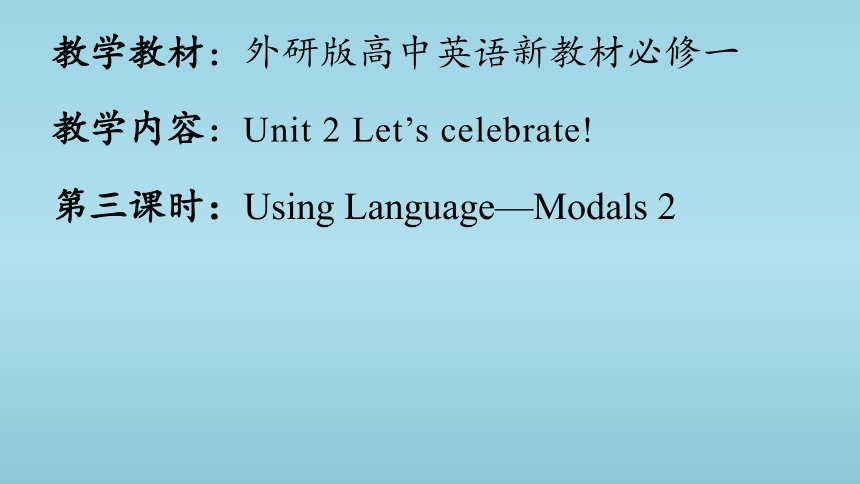
|
|
| 格式 | pptx | ||
| 文件大小 | 54.6MB | ||
| 资源类型 | 教案 | ||
| 版本资源 | 外研版(2019) | ||
| 科目 | 英语 | ||
| 更新时间 | 2023-02-26 19:57:39 | ||
图片预览

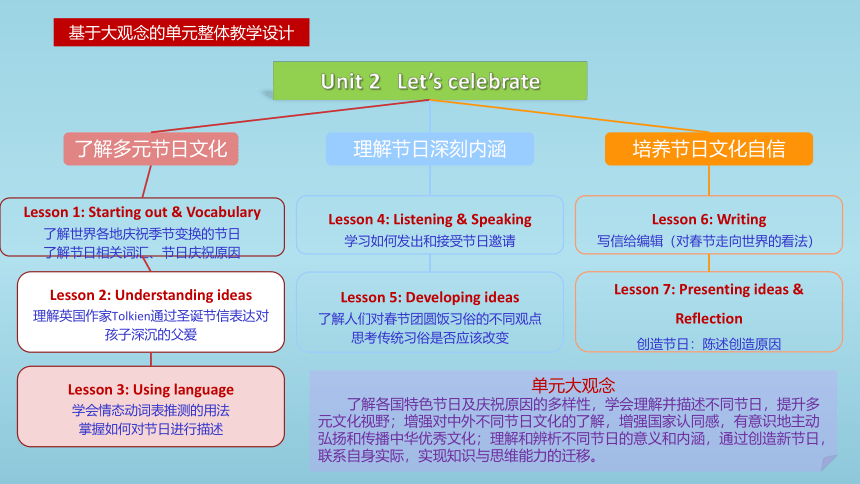
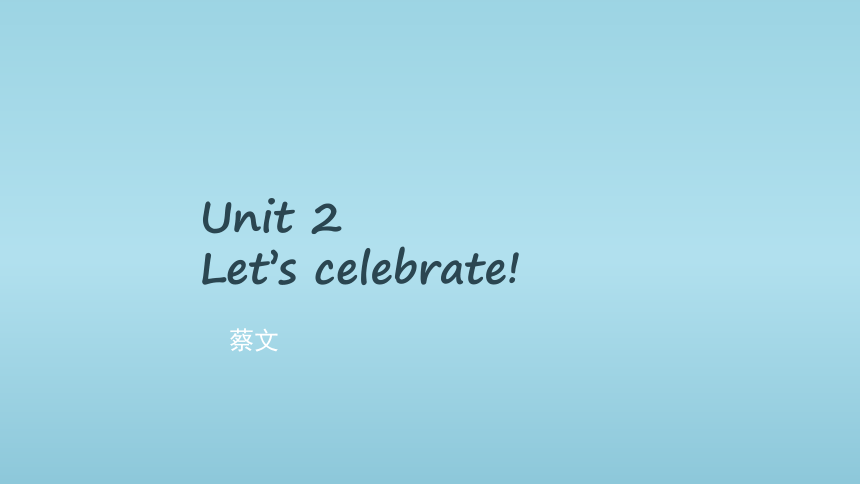
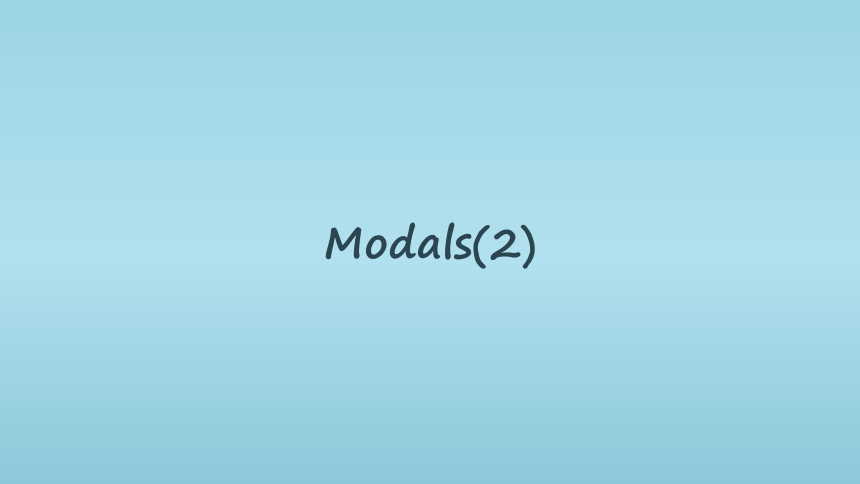
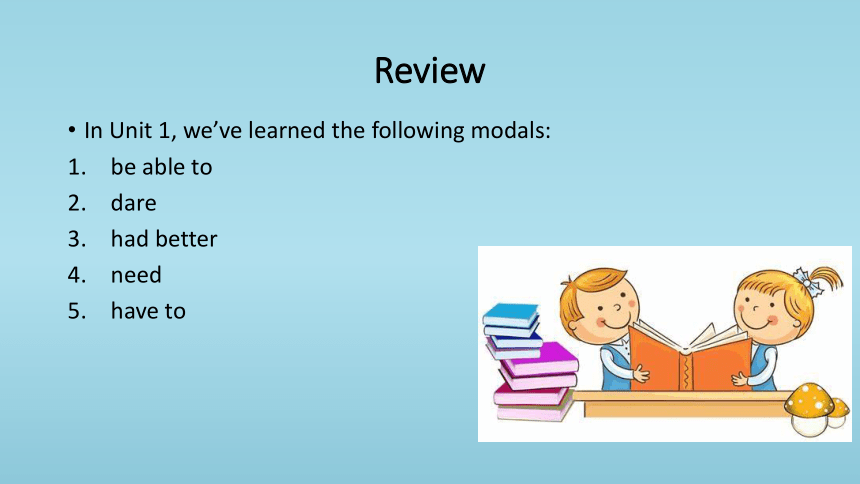
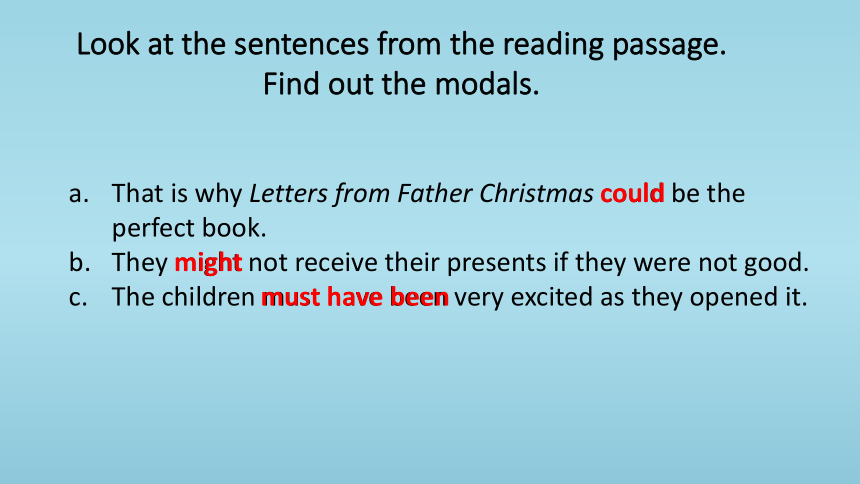
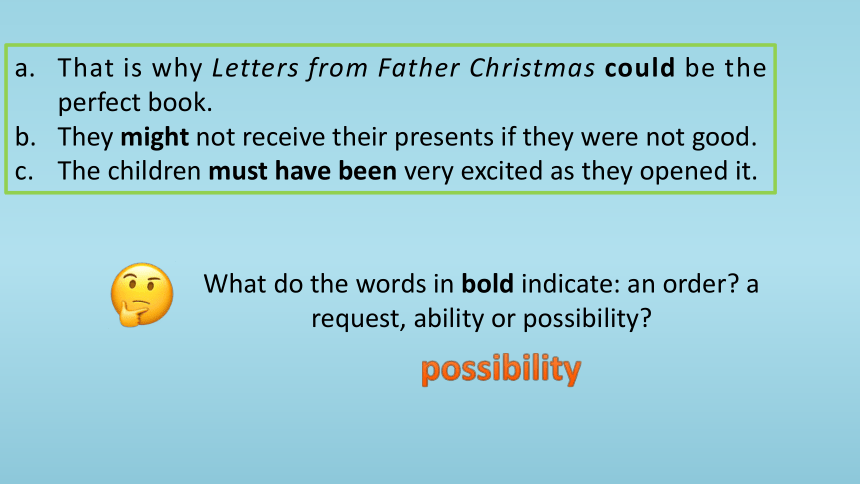

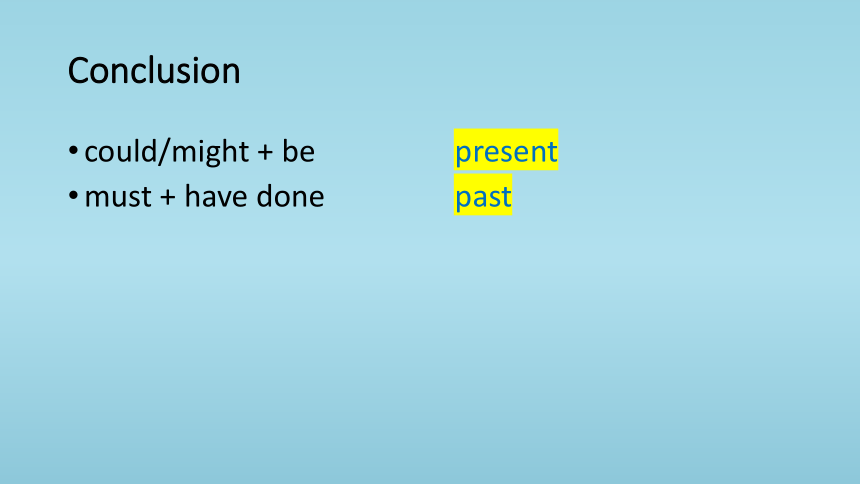
文档简介
(共25张PPT)
教学教材:外研版高中英语新教材必修一
教学内容:Unit 2 Let’s celebrate!
第三课时:Using Language—Modals 2
基于大观念的单元整体教学设计
Unit 2 Let’s celebrate
了解多元节日文化
理解节日深刻内涵
培养节日文化自信
Lesson 1: Starting out & Vocabulary
了解世界各地庆祝季节变换的节日
了解节日相关词汇、节日庆祝原因
Lesson 2: Understanding ideas
理解英国作家Tolkien通过圣诞节信表达对孩子深沉的父爱
Lesson 3: Using language
学会情态动词表推测的用法
掌握如何对节日进行描述
Lesson 4: Listening & Speaking
学习如何发出和接受节日邀请
Lesson 5: Developing ideas
了解人们对春节团圆饭习俗的不同观点
思考传统习俗是否应该改变
Lesson 6: Writing
写信给编辑(对春节走向世界的看法)
Lesson 7: Presenting ideas & Reflection
创造节日:陈述创造原因
单元大观念
了解各国特色节日及庆祝原因的多样性,学会理解并描述不同节日,提升多元文化视野;增强对中外不同节日文化的了解,增强国家认同感,有意识地主动弘扬和传播中华优秀文化;理解和辨析不同节日的意义和内涵,通过创造新节日,联系自身实际,实现知识与思维能力的迁移。
Unit 2
Let’s celebrate!
蔡文
Modals(2)
Review
In Unit 1, we’ve learned the following modals:
be able to
dare
had better
need
have to
Look at the sentences from the reading passage.
Find out the modals.
That is why Letters from Father Christmas could be the perfect book.
They might not receive their presents if they were not good.
The children must have been very excited as they opened it.
could
must have been
might
That is why Letters from Father Christmas could be the perfect book.
They might not receive their presents if they were not good.
The children must have been very excited as they opened it.
What do the words in bold indicate: an order a request, ability or possibility
possibility
Conclusion
could/might + be present
must + have done past
1. could
To indicate possibility
‘could’ is less sure than ‘can’
Can the news be true ----It can’t be true.
Someone is knocking at the door. Who could it be
What shall we do this evening ---We could/can go to cinema.
To indicate ability
can: ability at present could: ability in the past
My grandmother can do some shopping on the Internet, but she couldn’t last year.
1. could
To make a request:
‘could’ sounds more polite than ‘can’
Can you play outside
Could you do me a favor
2. might
Study the example situation.
To indicate possibility
‘might’ is less sure than ‘may’
There might not be enough time to discuss everything at the meeting.
② To ask for permission
May/Might I play the computer games after supper
---Yes, you may./No, you mustn’t/can’t.
③ To express a not real situation
If I were in Tom’s position, I might look for another job.
2. might
subjunctive mood
might/may as well
3. must have done
It must have rained last night, for the ground is wet.
“She must have left the house by now; it’s nearly 11 o'clock.”
(Martin and Lucy are standing at the door of their friend’s house. They have rung the doorbell twice, but nobody has answered.) Lucy says: There’s nobody at home. They must have gone out.
I didn’t hear the phone. I must have been asleep.
“I’ve lost one of my gloves.” “You must have dropped it somewhere.”
To make guesses or deductions about an action in the past that we believe has definitely happened or possibly happened.
can + have done (mainly used in negatives and questions)
You can’t have forgotten her.
Where can she have put it
could + have done (mainly used in negatives and questions)
He could not have been more than 16 at that time.
Could she have forgotten my address
might + have done
He may/might have come by train.
should + have done
They should have arrived in Beijing by this time.
He might have given you more help, even though he was very busy.
Did you listen to the speech ---No, we could have attended it, but we had a lot of traffic on our way.
The plant is dead. Maybe I should have given more water.
Your brother has failed in English again. You ought to have given him more help.
Mr. Smith didn’t come last night, did he ---No. we needn’t have waited for him. A whole night was wasted.
To express speakers’ dissatisfaction or regret over the past with a strong mood of blame.
Let’s practice!
Rewrite the underlined sentences in the conversation using can/could, may/might and must
You must be feeling tired now.
It may/might/could be him.
That must be Lucy!
That can’t be Lucy.
They may/might/could be from our school.
The woman in red must be very excited to buy so many things.
The man with a wallet in his hand might be a bit reluctant to pay.
The woman with glasses may be very tired to get up so early and carry so many bags.
The cashier might be feeling uncomfortable as he is sweating a lot.
1. ---I wonder why Sara looks worried today.
---I’m not sure, but she _____a small accident driving here.
A. could have B. might have C. might have had D. must have had
2. Helen ____go on the trip with us, but she isn’t quite sure yet.
A. shall B. must C. may D. can
3. It was a red light, William. You ____the car.
---Sorry, I didn’t see it.
A. must stop B. should stop C. must have stopped D. should have stopped
4. Mark _____ have hurried. After driving at top speed, he arrived half an hour early.
A. needn’t B. wouldn’t C. mustn’t D. couldn’t
5. May I take this book out of the reading room
---No, you ____. You read it in here.
A. mightn’t B. won’t C. needn’t D. mustn’t
6. The traffic is heavy these days; I ____ arrive a bit late, so could you save me a place
A. can B. must C. need D. might
7. Happy birthday!
---Thank you! It’s the best present I ____ for.
A. should have wished B. must have wished
C. need have wished D. could have wished
Thank you
教学教材:外研版高中英语新教材必修一
教学内容:Unit 2 Let’s celebrate!
第三课时:Using Language—Modals 2
基于大观念的单元整体教学设计
Unit 2 Let’s celebrate
了解多元节日文化
理解节日深刻内涵
培养节日文化自信
Lesson 1: Starting out & Vocabulary
了解世界各地庆祝季节变换的节日
了解节日相关词汇、节日庆祝原因
Lesson 2: Understanding ideas
理解英国作家Tolkien通过圣诞节信表达对孩子深沉的父爱
Lesson 3: Using language
学会情态动词表推测的用法
掌握如何对节日进行描述
Lesson 4: Listening & Speaking
学习如何发出和接受节日邀请
Lesson 5: Developing ideas
了解人们对春节团圆饭习俗的不同观点
思考传统习俗是否应该改变
Lesson 6: Writing
写信给编辑(对春节走向世界的看法)
Lesson 7: Presenting ideas & Reflection
创造节日:陈述创造原因
单元大观念
了解各国特色节日及庆祝原因的多样性,学会理解并描述不同节日,提升多元文化视野;增强对中外不同节日文化的了解,增强国家认同感,有意识地主动弘扬和传播中华优秀文化;理解和辨析不同节日的意义和内涵,通过创造新节日,联系自身实际,实现知识与思维能力的迁移。
Unit 2
Let’s celebrate!
蔡文
Modals(2)
Review
In Unit 1, we’ve learned the following modals:
be able to
dare
had better
need
have to
Look at the sentences from the reading passage.
Find out the modals.
That is why Letters from Father Christmas could be the perfect book.
They might not receive their presents if they were not good.
The children must have been very excited as they opened it.
could
must have been
might
That is why Letters from Father Christmas could be the perfect book.
They might not receive their presents if they were not good.
The children must have been very excited as they opened it.
What do the words in bold indicate: an order a request, ability or possibility
possibility
Conclusion
could/might + be present
must + have done past
1. could
To indicate possibility
‘could’ is less sure than ‘can’
Can the news be true ----It can’t be true.
Someone is knocking at the door. Who could it be
What shall we do this evening ---We could/can go to cinema.
To indicate ability
can: ability at present could: ability in the past
My grandmother can do some shopping on the Internet, but she couldn’t last year.
1. could
To make a request:
‘could’ sounds more polite than ‘can’
Can you play outside
Could you do me a favor
2. might
Study the example situation.
To indicate possibility
‘might’ is less sure than ‘may’
There might not be enough time to discuss everything at the meeting.
② To ask for permission
May/Might I play the computer games after supper
---Yes, you may./No, you mustn’t/can’t.
③ To express a not real situation
If I were in Tom’s position, I might look for another job.
2. might
subjunctive mood
might/may as well
3. must have done
It must have rained last night, for the ground is wet.
“She must have left the house by now; it’s nearly 11 o'clock.”
(Martin and Lucy are standing at the door of their friend’s house. They have rung the doorbell twice, but nobody has answered.) Lucy says: There’s nobody at home. They must have gone out.
I didn’t hear the phone. I must have been asleep.
“I’ve lost one of my gloves.” “You must have dropped it somewhere.”
To make guesses or deductions about an action in the past that we believe has definitely happened or possibly happened.
can + have done (mainly used in negatives and questions)
You can’t have forgotten her.
Where can she have put it
could + have done (mainly used in negatives and questions)
He could not have been more than 16 at that time.
Could she have forgotten my address
might + have done
He may/might have come by train.
should + have done
They should have arrived in Beijing by this time.
He might have given you more help, even though he was very busy.
Did you listen to the speech ---No, we could have attended it, but we had a lot of traffic on our way.
The plant is dead. Maybe I should have given more water.
Your brother has failed in English again. You ought to have given him more help.
Mr. Smith didn’t come last night, did he ---No. we needn’t have waited for him. A whole night was wasted.
To express speakers’ dissatisfaction or regret over the past with a strong mood of blame.
Let’s practice!
Rewrite the underlined sentences in the conversation using can/could, may/might and must
You must be feeling tired now.
It may/might/could be him.
That must be Lucy!
That can’t be Lucy.
They may/might/could be from our school.
The woman in red must be very excited to buy so many things.
The man with a wallet in his hand might be a bit reluctant to pay.
The woman with glasses may be very tired to get up so early and carry so many bags.
The cashier might be feeling uncomfortable as he is sweating a lot.
1. ---I wonder why Sara looks worried today.
---I’m not sure, but she _____a small accident driving here.
A. could have B. might have C. might have had D. must have had
2. Helen ____go on the trip with us, but she isn’t quite sure yet.
A. shall B. must C. may D. can
3. It was a red light, William. You ____the car.
---Sorry, I didn’t see it.
A. must stop B. should stop C. must have stopped D. should have stopped
4. Mark _____ have hurried. After driving at top speed, he arrived half an hour early.
A. needn’t B. wouldn’t C. mustn’t D. couldn’t
5. May I take this book out of the reading room
---No, you ____. You read it in here.
A. mightn’t B. won’t C. needn’t D. mustn’t
6. The traffic is heavy these days; I ____ arrive a bit late, so could you save me a place
A. can B. must C. need D. might
7. Happy birthday!
---Thank you! It’s the best present I ____ for.
A. should have wished B. must have wished
C. need have wished D. could have wished
Thank you
